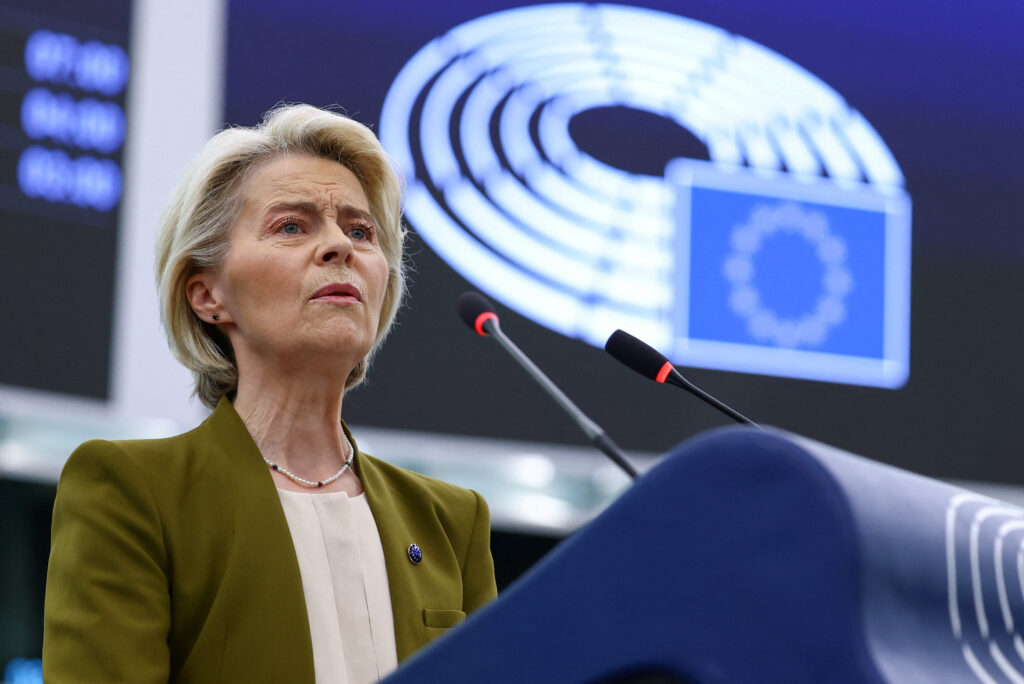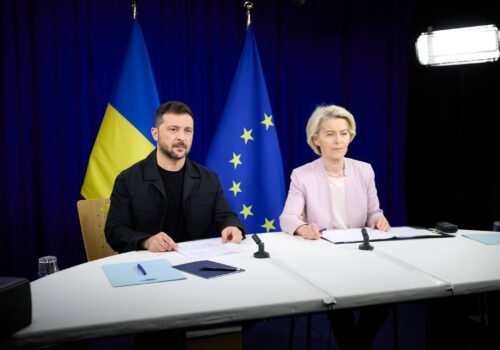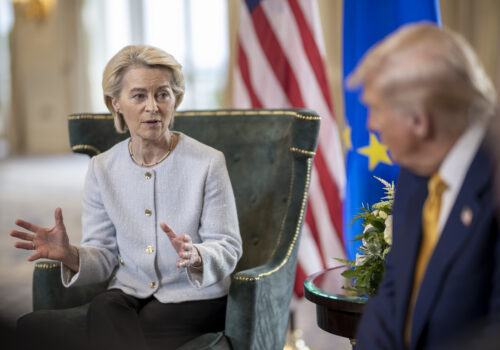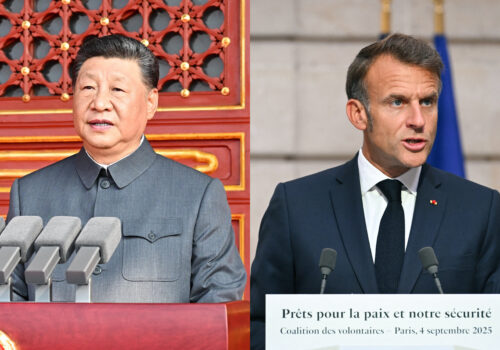European Commission President Ursula von der Leyen didn’t plan it this way. However, one of the most significant speeches ever given by a European leader, which she began with the words “Europe is in a fight,” coincided with European warplanes shooting down Russian drones over Poland.
Here are the facts: On Wednesday, Dutch F-35 and Polish F-16 fighters were involved in an operation that downed several Russian drones that had entered eastern Polish airspace near the border with Ukraine and Belarus. NATO held Article 4 consultations, called for by the Polish leadership, which bring together allies to discuss a common response when the territorial integrity, political independence, or security of any of its allies is threatened.
Russia’s action—“regardless of its intention—presents NATO with an unprecedented situation, as it marks the first time in history that the Alliance has directly engaged Russia in allied airspace,” wrote Torrey Taussig, who leads the Atlantic Council’s work on the Alliance.
But what about the European Union at a time when the United States increasingly expects Europeans to provide for their own security? The fighter jets were flown by European pilots, and they were defending European territory. Von der Leyen, not knowing when they were first drafted how timely her words would be, laid out the challenge with refreshing clarity on Wednesday. It’s worth reading every word of her 2025 State of the Union Address. But here are some high points.
“Europe is in a fight,” she said. “A fight for a continent that is whole and at peace. For a free and independent Europe. A fight for our values and our democracies. A fight for our liberty and our ability to determine our destiny for ourselves. Make no mistake—this is a fight for our future.”
She acknowledged that many Europeans are uncomfortable with such harsh terms, “because our Union is fundamentally a peace project. But the truth is that the world of today is unforgiving . . . Battlelines for a new world order based on power are being drawn right now. So, yes, Europe must fight. For its place in a world in which many major powers are either ambivalent or openly hostile to Europe. A world of imperial ambitions and imperial wars. A world in which dependencies are ruthlessly weaponized. And it is for all of these reasons that a new Europe must emerge.”
Her speech was unsettling in its warnings and moving in its details. She told the story of an eleven-year-old Ukrainian boy who had been abducted by Russian soldiers, but who had been rescued and sat in the audience with his mother. She announced that she would host a “Summit of the International Coalition for the Return of Ukrainian Children.”
“This war needs to end with a just and lasting peace for Ukraine. Because Ukraine’s freedom is Europe’s freedom,” von der Leyen said. Putting force behind these words, she announced a new program, called Qualitative Military Edge, that will support investment in Ukrainian military capabilities. She also announced a drone alliance with Ukraine, with Europe front-loading it with six billion euros. “Ukraine has the ingenuity,” she said. “What it needs now is scale.”
Though the speech was written before the Russian drone incident, she captured the moment, condemning the “reckless and unprecedented violation of Poland’s and Europe’s air space.” Her answer: more military and sanctions pressure to bring Russia to negotiations.
There was much more in the speech, but the bottom line was that Europe had to take responsibility for its own security in the face of an increasingly aggressive and determined Russia, led by Vladimir Putin. Notably, she mentioned the United States only a few times, and almost exclusively in relation to trade tensions. She did not mention US President Donald Trump at all, other than an oblique reference to his meeting on August 15 with Putin: “The images in Alaska were not easy to digest.”
As it is with every State of the Union address, whether American or European, there was a laundry list of other issues: artificial intelligence, energy, science, social rights, and migration. Much of that may be forgotten over time. What was unique in the speech was the rhetorical wake-up call to follow the Russian drones’ alarm bell and the stark reality that if Europeans don’t learn to fight, their peace project will be imperiled.
“This struggle, this fight, is deeply engrained in who we are as Europeans,” von der Leyen closed. “Eighty years ago our continent was hell on earth. Forty years ago, our continent was divided by a wall. But on each occasion, Europeans decided to fight for a better future. To make itself whole—and to make the whole strong. And that is what I will strive for every single day. Long live Europe.”
Left out again was any mention of the United States as an ally or security partner, even in reference to World War II and the Cold War, when US involvement was decisive. It remains to be seen precisely what role the United States will play in the European emergence that von der Leyen envisions as she says, “This must be Europe’s independence moment.”
Frederick Kempe is president and chief executive officer of the Atlantic Council. You can follow him on X: @FredKempe.
This edition is part of Frederick Kempe’s Inflection Points newsletter, a column of dispatches from a world in transition. To receive this newsletter throughout the week, sign up here.
Further reading
Sun, Aug 17, 2025
Will Europe rise to its strategic moment?
Inflection Points By Frederick Kempe
With the future of European security on the line, the Ukrainian president and several European allies will meet with US President Donald Trump on Monday.
Wed, Aug 6, 2025
Europe’s play to keep Trump happy cannot come at the expense of a longer-term strategy
New Atlanticist By Torrey Taussig, Josh Lipsky
Even as the EU prioritizes defense and security interests with the US, it could come at the cost of economic and political cohesion in the bloc.
Thu, Sep 4, 2025
In Beijing and Paris, a tale of two global futures
Inflection Points By Frederick Kempe
Recent gatherings in China and France revealed that competing international orders are crystallizing. What part will the United States play?
Image: European Commission President Ursula von der Leyen delivers the State of the European Union address to the European Parliament, in Strasbourg, France, September 10, 2025. REUTERS/Yves Herman



